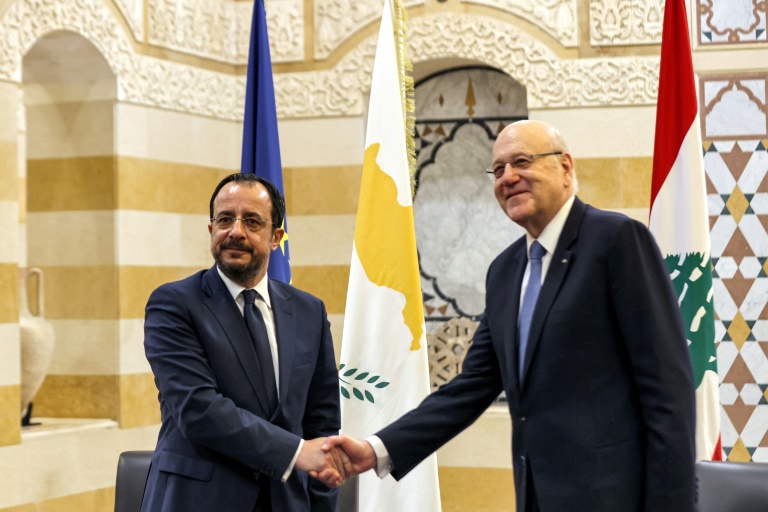Cyprus president discusses Syrian refugee influx in Lebanon visit

Lebanese Prime Minister Najib Mikati received Cypriot President Nikos Christodoulides in Beirut where the two discussed migration
Beirut – Lebanon’s Prime Minister Najib Mikati and visiting Cypriot President Nikos Christodoulides discussed migration on Monday in Beirut, both sides said, as Nicosia pushes the Lebanese authorities to stem boat departures.
Cyprus says the Israel-Hamas war, which has triggered a flare-up on the Israel-Lebanon border, has weakened Lebanon’s efforts to monitor its territorial waters and prevent migrant vessel departures.
The Mediterranean island nation has reported a surge in Syrian arrivals in recent weeks.
According to Lebanese authorities, the country is home to some two million Syrian refugees — with 800,000 registered with the United Nations — the world’s highest number per capita.
However, a grinding economic crisis has helped turn the country into a major departure point for refugees hoping to reach Europe.
“A very constructive discussion took place” between Mikati and Christodoulides, “during which the cooperation of the two countries with the substantial assistance of the European Commission was agreed upon,” said a statement from Cypriot government spokesperson Konstantinos Letymbiotis.
It did not detail the specifics of the agreement or the assistance.
Cyprus is the European Union’s easternmost member, located less than 200 kilometres (125 miles) from the coast of Lebanon and neighbouring Syria.
A statement from the Lebanese premier’s office said Mikati and Christodoulides emphasised “the importance of finding a comprehensive and sustainable solution to the Syria displacement crisis”.
“Lebanon’s army and security forces are doing their best to stop illegal immigration,” Mikati was quoted as saying in the statement.
“But this cannot be achieved without the return of those seeking safety to safe areas in Syria or securing their residency in third countries,” he added.
Nicosia, which for several years has had an agreement with Beirut for the return of irregular migrants, last week urged Brussels to compel Lebanon to stop migrant boats from leaving for Cyprus, suggesting EU assistance should be cut if flows persist.
Christodoulides has also been pushing the EU to declare parts of Syria, ravaged by more than a decade of civil war, as safe places to which asylum seekers can be legally returned.
– ‘Root causes’ –
Mikati urged the EU and the international community to “take new steps and reconsider their policies on Syria’s security”, but noted that “it is also necessary to increase efforts to address the root causes of the refugee crisis”.
Christodoulides met with Mikati because Lebanon’s presidency is vacant amid protracted political wrangling.
Syria’s civil war, which erupted in 2011 after the government repressed peaceful pro-democracy protests, has killed more than half a million people and ravaged the country’s economy and infrastructure, while security remains tenuous across swathes of the country.
The United Nations refugee agency, UNHCR, told AFP that as of April 4, more than 40 boats carrying some 2,500 people had landed in Cyprus this year, but was unable to specify which had departed from Lebanon and which from Syria.
Last year, UNHCR expressed concern over the return of more than 100 Syrian migrants to Lebanon, saying they had not been screened to assess whether they needed legal protection or if they might be deported to their homeland.
Nicosia insists returns are legal under its bilateral agreement with Beirut.
Lebanese authorities from time to time announce they have thwarted smuggling operations by sea, or the arrest of both smugglers and would-be migrants.
Christodoulides on Sunday met with Greek Prime Minister Kyriakos Mitsotakis and discussed “concerns about the creation of a new migration route due to the instability and violence currently prevailing in the Middle East”, according to a statement from the Greek premier’s office.
